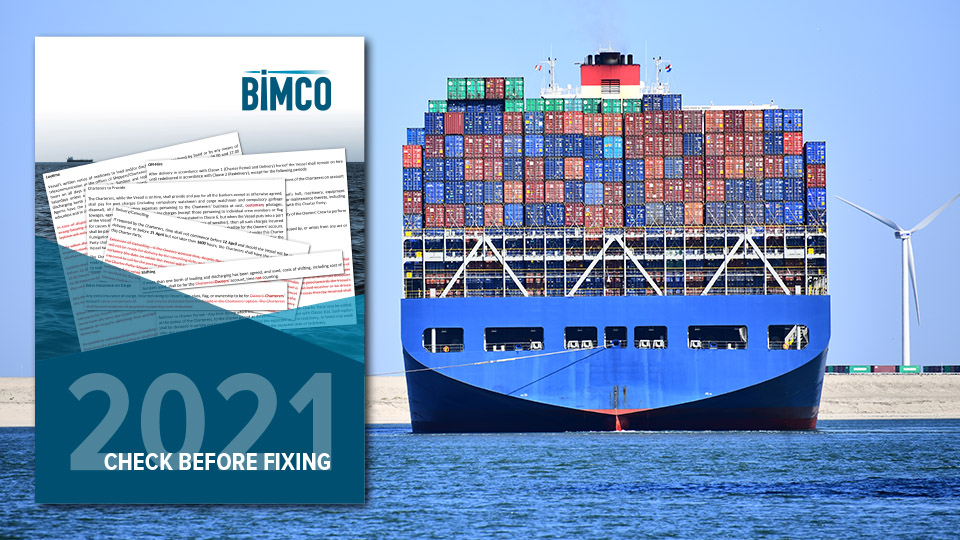2020 Marine Fuel Sulphur Content Clause for Time Charter Parties
Overview
BIMCO has produced two clauses for time charter parties to address key contractual issues relating to the switch to fuel with a maximum sulphur content of 0.50% as of 1 January 2020. The two clauses are the 2020 Marine Fuel Sulphur Content Clause, which replaces the BIMCO Fuel Sulphur Content Clause 2005, and the 2020 Fuel Transition Clause, which deals with switching between fuel with a maximum sulphur content of 3.50% and fuel with a maximum sulphur content of 0.50% by 1 January 2020. Both clauses should be incorporated into time charter parties.
This clause was published on 10 December 2018.
2020 Marine Fuel Sulphur Content Clause for Time Charter Parties
BIMCO 2020 Marine Fuel Sulphur Content Clause for Time Charter Parties
(a) For the purpose of this Clause, "Sulphur Content Requirements" means any sulphur content and related requirements as stipulated in MARPOL Annex VI (as amended from time to time) and/or by any other applicable lawful authority.
(b) The Charterers shall supply fuels to permit the Vessel, at all times, to comply with any applicable Sulphur Content Requirements. All such fuels shall meet the specifications and grades set out in this Charter Party.
The Charterers also warrant that any bunker suppliers, bunker craft operators and bunker surveyors used by the Charterers shall comply with the Sulphur Content Requirements.
The Charterers shall indemnify, protect, defend and hold harmless the Owners from any and against all losses, damages, liabilities, delays, deviations, claims, fines, costs, expenses, actions, proceedings, suits, demands arising out of the Charterers’ failure to comply with this subclause (b), and the Vessel shall remain on hire throughout.
(c) The Owners warrant that the Vessel shall comply with the Sulphur Content Requirements.
Subject to the Charterers having supplied the Vessel with fuels in accordance with subclause (b), the Charterers shall not otherwise be liable for any losses, damages, liabilities, delays, deviations, claims, fines, costs, expenses, actions, proceedings, suits, demands arising out of the Owners’ failure to comply with this subclause (c).
Background
Sulphur Content Compliance
The 2020 Marine Fuel Sulphur Content Clause replaces the BIMCO Fuel Sulphur Content Clause 2005 and can be incorporated into time charter parties as of now. The new clause is designed to work together with existing time charter bunker clauses which already cover issues relating to the specifications, grades and quality/suitability of the fuel provided by time charterers. BIMCO publishes numerous bunker-related clauses in its Suite of Standard Bunker Clauses for Time Charter Parties.
By making the 2020 Marine Fuel Sulphur Content Clause an addition to existing time charter bunker clauses we have been able to keep the clause short and simple. It is written as a straightforward compliance provision with the sulphur content requirements of MARPOL Annex VI. The sulphur content requirements include the present limit of 3.50% as well as the 0.50% that will apply after 1 January 2020 – and it also includes the maximum sulphur content for ECAs. This is why the clause can be incorporated into time charters now and will remain valid after the new IMO 2020 regime comes into force in 2020. Issues relating to the specifications, grades and quality/suitability of the fuel provided by time charterers are dealt with by existing bunker clauses in time charters, so these should not need to be amended in relation to sulphur content alone.
The BIMCO Suite of Bunker Clauses provides a comprehensive contractual “package” covering essential aspects of bunkering such as quality, liability, operations, sampling, and fuel testing. BIMCO has reviewed its suite of bunker clauses and concluded that, when used together with 2020 Marine Fuel Sulphur Content Clause, it can continue to be incorporated into time charter parties post-2020, without the need for amendment.
Drafting team
The 2020 Bunker Clauses have been developed by a team comprised of owners, charterers, bunker suppliers, P&I clubs and legal experts. BIMCO is grateful to the following individuals for assisting us with this important project:
- Peter Eckhardt, F. Laeisz, Hamburg (Chairman)
- Daniel Chu, Navig8, London
- Nicola Ioannou, Oceanfleet Shipping, Athens
- Ann Shazell, Cargill Ocean Transportation, Geneva
- Rob Crees, World Fuel Services, London
- Michele White, INTERTANKO, London
- Tiejha Smyth, North of England P&I Club, Newcastle
- Paul Dean and Alessio Sbraga, HFW, London
The BIMCO secretariat was represented by Lars Robert Pedersen, Deputy Secretary General; Grant Hunter, Head of Contracts and Clauses; and Mads Wacher Kjærgaard, Assistant Manager, Contracts & Clauses.
Explanatory Notes
The following explanatory notes are intended to provide some background to the thinking behind the 2020 Marine Fuel Sulphur Content Clause for Time Charter Parties. If you have any questions about the clauses that we haven’t answered in the explanatory notes, please contact us at contracts@bimco.org and we will be happy to help.
2020 Marine Fuel Sulphur Content Clause
This clause deals with the basic obligation to comply with the sulphur content requirements of MARPOL Annex VI. It deals only with compliance with sulphur content – other issues relating the specifications, grades, quality and suitability of the fuels supplied should be dealt with by existing bunker clauses in time charters. This avoids unnecessary duplication and potential conflicts between provisions. This clause can be incorporated into time charter parties as of now.
The 2020 Marine Fuel Sulphur Content Clause replaces the previous sulphur content clause contained in BIMCO’s Suite of Standard Bunker Clauses for Time Charter Parties, the Bunker Fuel Sulphur Content Clause for Time Charter Parties 2005. The new clause also deals with the sulphur content requirements of ECAs, so you do not need to include both versions in your time charter parties.
Subclause (a) – Sulphur Content Requirements
The sulphur content requirements are essentially the maximum sulphur contents and applicable dates stated in MARPOL Annex VI (including ECAs). The phrase “and related requirements” refers to any additional documentary requirements such as the Bunker Delivery Note.
The phrase “and/or by any other applicable lawful authority” means any additional regulation that may be applied by authorities as a supplement to MARPOL Annex VI and which must be complied with.
Subclause (b)
The first paragraph of this subclause contains an express requirement for the fuel provided by the time charterers to meet the “specifications and grades” which are commonly set out elsewhere in a time charter party. The purpose of the clause is to deal with sulphur content compliance, not to address fuel quality. This approach avoids the potential for conflicting wording between the sulphur content clause and existing clauses dealing with bunkers.
The second paragraph of the subclause obliges the charterers to make sure that their suppliers etc. also comply with applicable regulation relating to sulphur content. Essentially, this provision emphasises that charterers need to exercise care in selecting bunker suppliers and related services that are also MARPOL compliant where applicable.
The remainder of this subclause provides an important indemnity to protect the owners who have, effectively, entrusted charterers to stem fuel of the required sulphur content, yet still remain responsible for the repercussions of non-compliance with MARPOL which – together with associated losses – may be significant. For the avoidance of doubt, if the charterers are in breach of their obligations, the ship is to remain on hire. The charterers cannot benefit from their own breach.
Subclause (c)
The owners’ warranty that the ship will comply with the sulphur content requirements of MARPOL Annex VI means that the ship is able to consume fuels that meet such requirements. So this does not need to be separately stated.
There is no reciprocal indemnity for charterers. Provided the charterers have complied with their obligation to supply fuel that complies with MARPOL sulphur content requirements, they will not be liable for the owners’ failure to comply with MARPOL. We have deliberately not simply mirrored the owners’ indemnity in subclause (b) because such wording could, potentially, afford the charterers' claims a special status and/or elevate their protection under the general scheme of the charter party, over and above what they would have normally. Whereas, adequate protection is already given to the charterers by virtue of the owners' warranty and an exclusion of liability at subclause (c), and, in any event, they would be entitled to pursue potential claims for damages for breach of contract against the owners in the normal way.
Issues not addressed in the 2020 Clauses
The 2020 Fuel Transition Clause is not intended for use by vessel fitted with and operating exhaust gas cleaning systems (i.e. scrubbers).
Careful consideration should be given to bunker delivery/redelivery clauses in terms of the types of fuel on board and the prices to be paid – particularly for time charters spanning 1 January 2020 up until the carriage ban date on 1 March 2020.
Related Help & Advice
Create or edit a contract
The one-stop digital shop for all the standard maritime contracts and clauses you’ll ever need.
Latest Related News
-
IBIA and BIMCO team up to collaborate on fuel and maritime challenges
IBIA - The International Bunker Industry Association and BIMCO have signed a Memorandum of Understanding (MoU) to collaborate on some of the monumental challenges and opportunities within the areas of bunker, marine energy and maritime sectors and help facilitate shipping’s decarbonisation efforts.
-
VPS Bunker Alerts
Veritas Petroleum Services (VPS) publish regular Bunker Alerts based entirely on fuel samples. The bunker samples are analysed by VPS whenever a short-term quality issue is identified in a specific port or region.
-
BIMCO adopts portfolio of four ETS clauses
The shipping industry is facing an increase in new regulations from the International Maritime Organization (IMO) and the European Union (EU) and an increase in the urgency to decarbonise. To support the industry, BIMCO has developed a portfolio of new emission trading scheme (ETS) clauses.
-
BIMCO adopts new CII clause for Voyage Charter Parties
The shipping industry is facing an increase in new regulations from the International Maritime Organization (IMO) and the European Union (EU) and an increase in the urgency to decarbonise. To support the industry, BIMCO has developed a new CII Clause for Voyage Charter Parties. The clause was adopted by BIMCO’s Documentary Committee on 11 October and is the latest addition to BIMCO’s portfolio of carbon clauses.
-
BIMCO’s CII clause adopted
The BIMCO Documentary Committee has adopted a CII Operations Clause for Time Charter Parties which will help the industry commercially navigate the complexities of the new CII regulations from the International Maritime Organization (IMO).
ELSEWHERE ON BIMCO
Holiday calendar
BIMCO's Holiday Calendar covers general holidays in over 150 countries, plus local holidays and working hours in more than 680 ports around the world.
Learn about your cargo
For general guidance and information on cargo-related queries.




